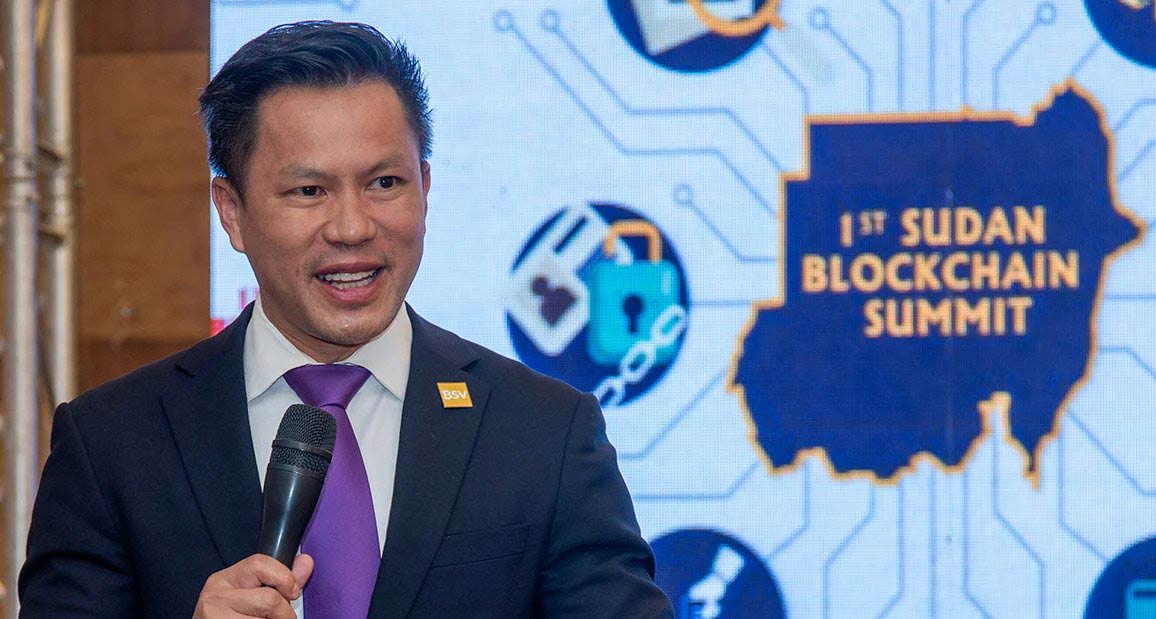The BSV ecosystem’s Blockchain for Government Initiative visited the capital city of Khartoum in the Republic of the Sudan in April 2021 at the invitation and under the patronage of Sudan’s Ministry of Telecommunication and Digital Transformation, where it collaborated with local officials to host the country’s first Blockchain Summit and Workshop.
The event was held at the Al Salam Hotel in Khartoum on April 8-9 and was attended by government officials, business leaders and university students to learn how blockchain technology can build better digital infrastructure and grow the domestic economy through diverse use cases.
Speakers at the event included industry leaders in the Bitcoin SV (BSV) and enterprise blockchain spaces, with each experts addressing different facets of blockchain technology and its potential application in Sudan’s digital transformation.
The delegation of experts from the Blockchain for Government Initiative was led by Bitcoin Association Founding President Jimmy Nguyen and Black Stone Data Solutions co-founder Ahmed Yousif, who was born in Sudan and is now based out of the Kingdom of Saudia Arabia.
Other delegates included:
- Muhammad Salman Anjum – Chief Mate at InvoiceMate and Head of the BSV Hub for the Middle East & South Asia (UAE/Pakistan)
- Mohammed Ibrahim Jega – co-founder of Domineum Blockchain Solutions (Nigeria)
- Stephan Nilsson – CEO of UNISOT and Abendum (Norway)
- Robert Rice – CEO of Transmira (USA)
- Phillip Runyan – managing partner of Veridat (USA)
- Patrick Prinz – regional manager for Europe & Head of Operations at Bitcoin Association (Switzerland)
In-depth presentations were given, dialogues and panel discussions were held, and speakers addressed many questions fielded by government, business, and academic representatives in the audience.
Sudan’s first Blockchain Summit and Workshop was a rousing success, offering the country’s government and people more insight into the world of Bitcoin as a data network (not just a digital currency or investment asset) and the potential for blockchain technology to accelerate their digital transformation migration to the cutting-edge of global innovation.
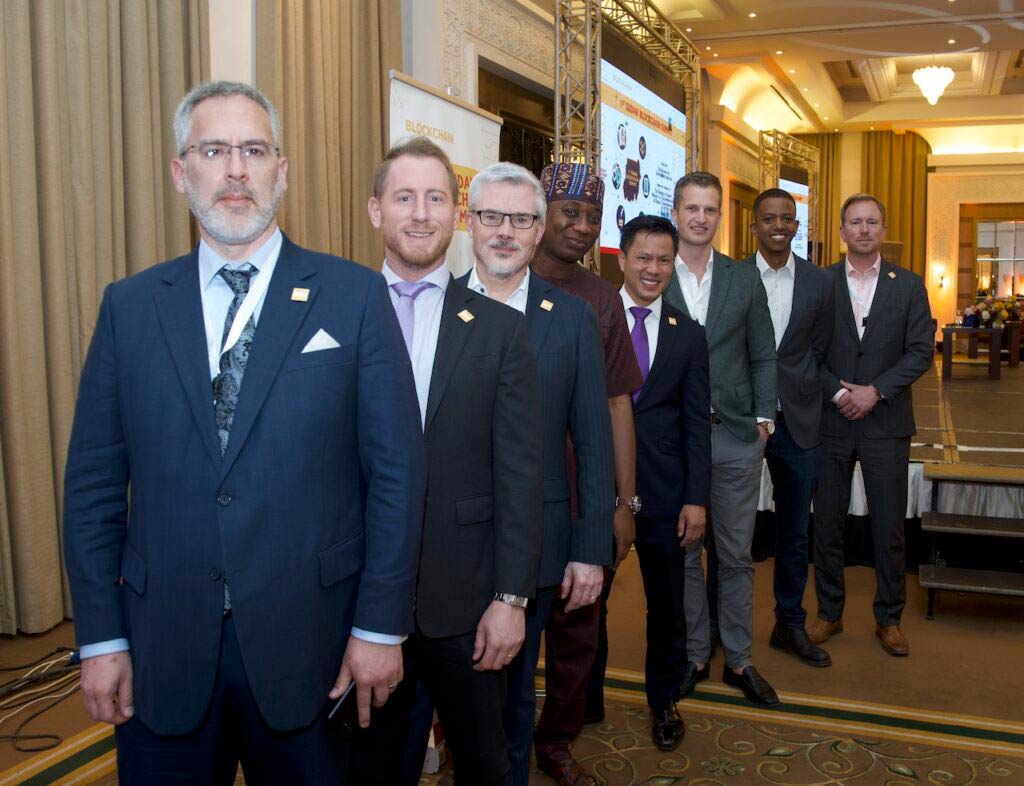
Bringing blockchain to Sudan
Sudan Minister of Telecommunications and Digital Transformation Hashim Hasabelrasoul Hashim opened the summit, after which Ahmed Yousif and Jimmy Nguyen took the stage to introduce blockchain technology and give the audience an idea of its potential applications in Sudan.
Yousif explained that adopting blockchain technology could enable Sudan to assume its position as an international technology leader, in contrast to its current position on the ‘edge’ of the global Internet ecosystem.
‘When the Internet started, it started from the centre and moved to the edge, where Sudan and developing countries are now,’ he said.
‘They are getting the digital crumbs of the Internet. They are using the fraction of the speed. They are using the leftovers of the technology because it started in the centre.’
He said that while Sudan is at the edge of this ecosystem, it can empower its technological competitiveness by adopting blockchain technology, which can empower countries distant from the centre of the current tech ecosystem.
‘Blockchain has the potential to make Sudan a world technology leader by empowering those who are at the edge,’ said Yousif.
Nguyen provided an overview of blockchain technology and spoke about the potential applications of BSV-based solutions.
He explained the role of Bitcoin Association in facilitating the growth of a burgeoning ecosystem of businesses and applications built on the BSV blockchain, as well as the strength of this blockchain as a candidate platform for government and enterprise solution deployment.
Bitcoin SV is the blockchain most closely aligned with the Bitcoin described in the original Satoshi Nakamoto white paper and subsequently supports low transaction fees, high throughput, unbounded scaling and a fully-featured scripting language running on a reliable and stable platform.
Nguyen also encouraged attendees interested in finding out more about Bitcoin and the potential of blockchain technology to read the original Bitcoin whitepaper, posted online in 2008 by Satoshi Nakamoto.
Sudan National Information Center (NIC) Director General Ibrahim Bakhit gave background on Sudan’s political and economic climate and noted the challenges of enabling digital transformation in the country while also outlining ways to address them.
‘The challenges for the ecosystem here are significant. Sudan has very good human resources but there are problems with its old technology, and I think blockchain can play a significant role in easing some of those,’ Bakhit said.
He added that one of the key obstacles for Sudan to overcome was the digitisation of identity and the merging of citizen data with the local geography.
‘The starting point for any transformation is digital identity. Unless you have digitised the human beings in this country and know where they live, what they do and their location – in other words, you put demography on top of geography – you can’t start anywhere – that’s the main thing.’
Bakhit lauded the potential benefits of a blockchain-backed civil registry, as well as several other potential use cases of blockchain that could be implemented in Sudan.
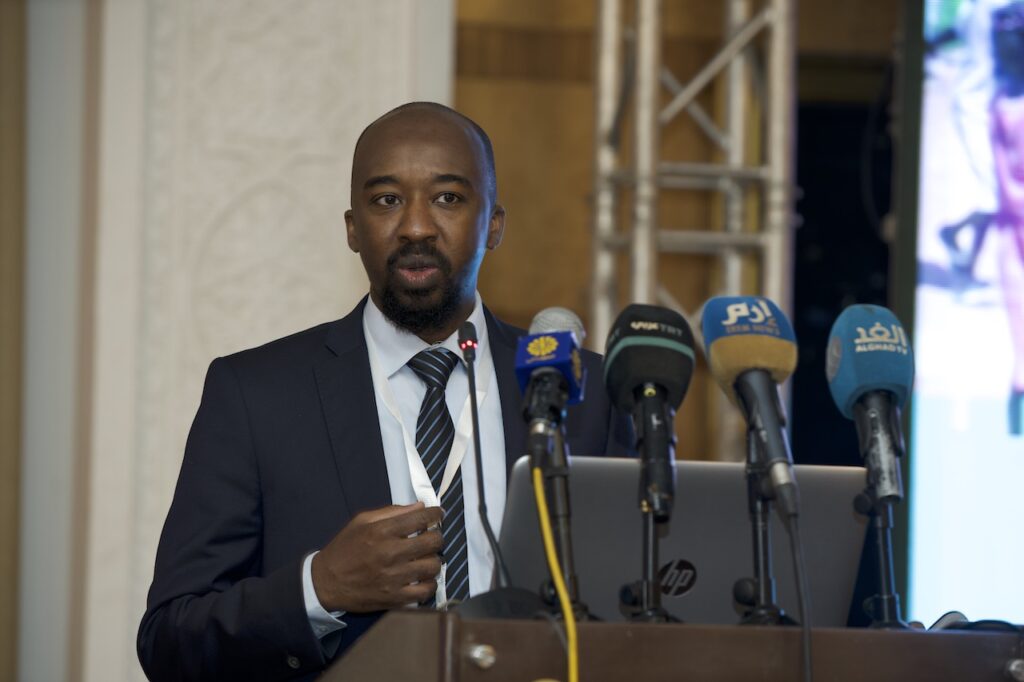
Blockchain in Sudan
Diving deeper into the potential applications of blockchain technology and what it is and is not capable of, Muhammad Salman Anjum explained that many perceptions of the technology were misinformed, and he corrected common misunderstandings when it comes to its potential applications.
Salman is head of the new BSV Hub for the Middle East and South Asia, as well as the Chief Mate at InvoiceMate – a next-generation automation platform providing enhanced fraud resistance and AI-powered services to make existing systems and accounts ready for the future requirement of interoperability with digital assets and currencies.
Blockchain’s use case as a triple-entry accounting system makes it the ideal candidate for the next generation of invoicing and accounts processing, which Salman aims to realise through his InvoiceMate platform.
He spoke about the problems blockchain is designed to solve, the advantages of a distributed ledger system and how this can mitigate the threat of bad actors.
Salman also referred to the dual aspects of blockchain technology – digital currency and enterprise.
‘Blockchain is like a coin – it has two sides: one is the crypto side and the other one is the enterprise side,’ he said.
‘Both are equally important, so if you don’t have one side you can still use the second side.’
Looking at the potential enterprise uses of blockchain technology, Salman referenced Gartner research which identified the public sector as the industry where blockchain technology has the most benefit and could see the most adoption. He also noted that the technology and financial services industries are expected to undergo significant adoption of blockchain technology in the future.
With regards to public sector applications of blockchain technology, Salman noted the significant operational efficiencies that could be created in identity management through the digitisation of citizen identities and conducting governmental analytics using the BSV blockchain as a data structure.
Salman also chaired a panel discussion with Ahmed Yousif, capital markets expert Abdelazim Alamawy and Sudanese economist expert Faroug Kamberisi.
The panel members discussed the state of digital transformation in Sudan and the country’s plans for the future, debating the extent to which blockchain technology may play a role in the nation’s digital evolution.
Salman highlighted that Sudan’s approach to digital transformation may allow it to use blockchain to leapfrog older technologies and catch up with or overtake many other countries.
‘Sudan has a chance to leapfrog. There is a concept called leapfrogging that especially applies in the tech and digital transformation space,’ he said.
‘To give an analogy from the telecoms industry, you can leapfrog from 3G to 5G directly without going to 4G. Similarly, you are now in need of digital transformation; rather than doing that digital transformation with the tools of 2005 or 2010, let’s do it with the technology of today. That will give you more power, it will be more sustainable in the coming years, and it is a benefit in its own way.’
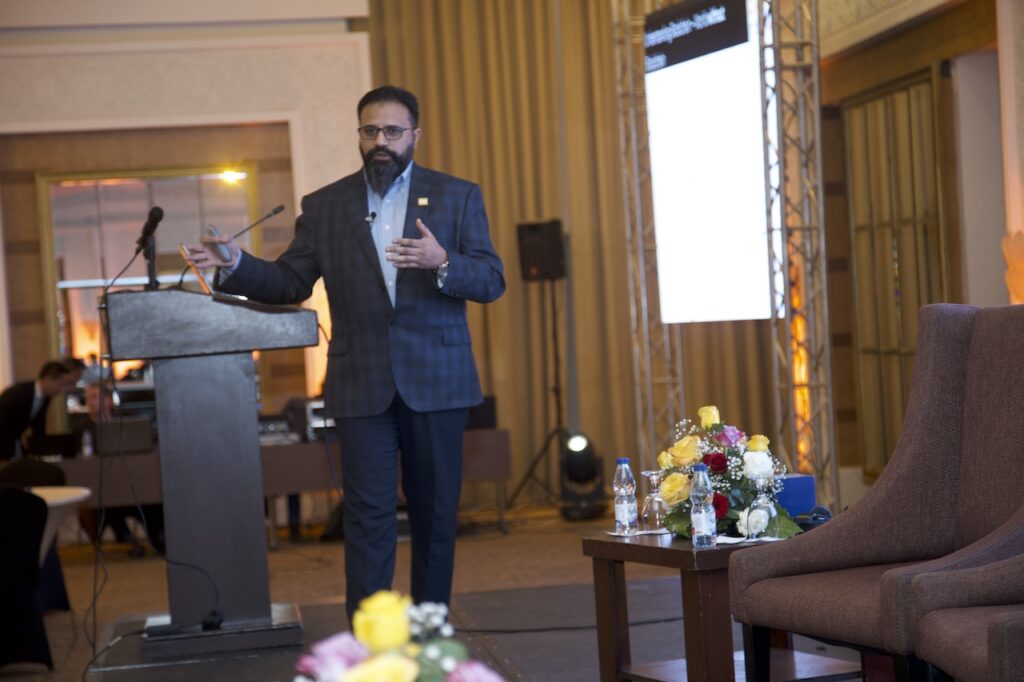
Payments and smart cities
Many African countries are in a great position to adopt cutting-edge financial and technology platforms to greatly accelerate this growth, a situation Domineum Blockchain Solutions co-founder Mohammed Ibrahim Jega has directly leveraged to improve cross-border payments and data management across the continent.
In his address at the Sudan Blockchain Summit and Workshop, Jega explained that his company has worked with African governments to improve data management and has deployed payment solutions across the world to better facilitate cross-border transactions.
He added that blockchain is currently a buzzword, but it needs to be understood and leveraged by the relevant industries to realise its true potential as a game-changing technology in the fintech and public sector spaces.
‘We need to take our destiny in our hands. It is very important to understand how we can utilise technology to help solve our digital problems,’ Jega said.
Stephan Nilsson, CEO of UNISOT and Abendum, told attendees how blockchain technology can improve accounting and supply chain practices to mitigate the risk of fraud and events such as the 2001 Enron scandal. He explained that double-entry accounting has been used for many years but remains vulnerable to dishonesty and collusion.
The solution Abendum uses is a triple-entry accounting practice that relies on the blockchain as a universal source of truth, preventing this type of fraud from occurring.
‘What we do is secure against fake invoicing. What we can do with triple-entry accounting is to lower audit costs by as much as 50% to 80% and maybe even more than that,’ Nilsson said.
‘It also gives us increased anti-money laundering compliance in the company. So, what we actually want to create with this product is peace of mind, both for the accountants and the CFO, but also for the whole board of the company.’
Another highlight of the Sudan Blockchain Summit and Workshop was the number of speakers involved in leveraging blockchain to enable smart cities and connected public ecosystems.
Transmira CEO Robert Rice spoke about how Sudan could leverage cutting-edge technologies such as AR and VR in combination with blockchain and Internet of Things (IoT) architecture to bolster its digital migration.
‘There is a tremendous amount of opportunity here using these new technologies, AR, VR, IoT and everything else, that we can make it very accessible and very easy for anybody to use and interact with,’ Rice said.
‘One of the things that I’m very excited about – and I’m very, very humbled and honoured to be here to share this with you and look towards the future – is how can we take these future technologies and make them accessible and usable today to lift up Sudan to the world even faster than other countries are adopting these new technologies.’
He added that blockchain is a necessary cornerstone for all these applications, as it ensures the data they are working with is true, valid and trustworthy.
The second day of the event also saw a session dedicated to the discussion of smart cities, sustainability solutions and IoT networks that leverage blockchain technology. This was chaired by Jimmy Nguyen and featured remote appearances by WeatherSV founder Paul Chiari, Predict Ecology CEO Daniel Keane and Smart Systems Head of Technology Brett Anquetil.
Topics of discussion ranged from concerns over blockchain scaling to meet the demand of smart cities to case studies on blockchain deployment for smart city meteorological monitoring applications.
The unbounded scaling of Bitcoin SV and continued reliability make it the clear choice for the deployment of these often-crucial applications, and panellists voiced their confidence in the continued ability of the blockchain’s ability to scale and its growing development ecosystem.
Muhammad Salman Anjum also rounded off the discussion with a presentation on how IoT and blockchain could be combined to create new and exciting solutions that would supersede existing services based on traditional infrastructure. He also mentioned how smart cities could use blockchain technology to generate and act on reliable data.
‘Smart cities have assets and you need to manage them. That means tracking, monitoring, tracing and sometimes monetising – all of that is possible with blockchain,’ Salman said.
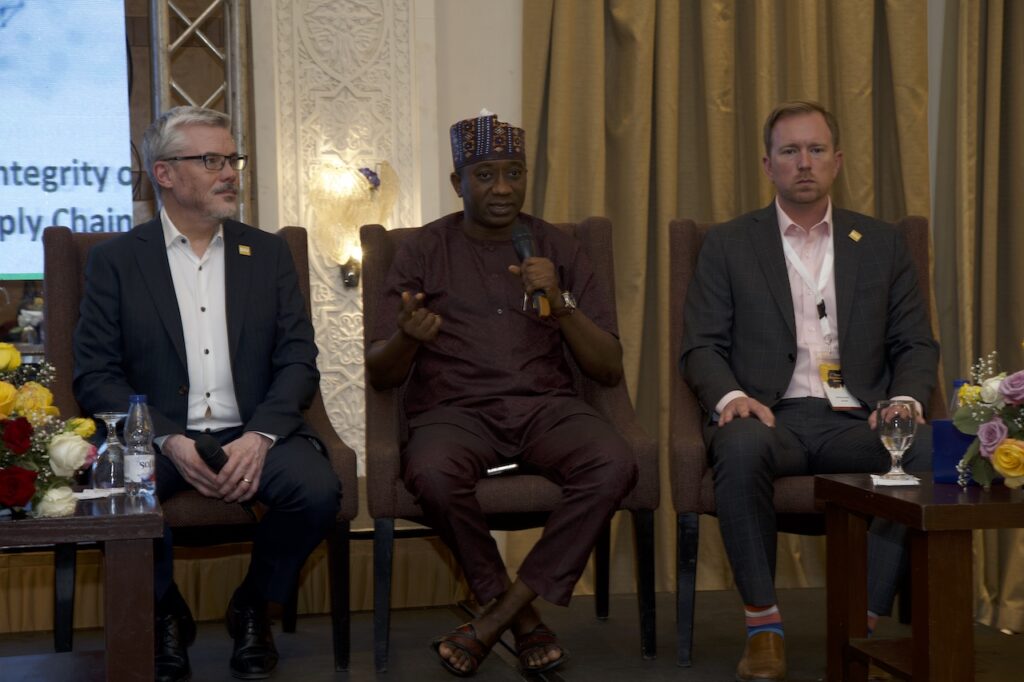
Supply chain and healthcare
Supply chain management is an industry which could see extraordinary efficiency improvements due to blockchain technology.
This was demonstrated by Mohammed Jega, who returned to the stage to refer to several case studies, including how Domineum had implemented data solutions for better cargo tracking in Sierra Leone – greatly improving efficiency and authority over logistics in the region.
Stephan Nilsson spoke about UNISOT’s supply chain solution, stating that blockchain-based supply chain management can greatly reduce the existing wastage of resources in the industry.
‘The big problem that we have today is that companies are not talking to each other or are not communicating information enough with each other and that leads to inefficiency. Global supply chains today have what’s called an aggregated efficiency that is less than 20%,’ he said.
‘80% is waste, and that is why the world economy today is stagnating and not growing as fast as it could.’
Using a publicly verifiable source of truth like the BSV blockchain would greatly reduce this inefficiency by allowing participants in the industry to independently verify information while still retaining security over information regarding the circulation of goods.
A similar problem arises in healthcare, which was the focus of several sessions at the summit and has particular relevance to developing countries due to the COVID-19 pandemic and the proliferation of fake medicines in Africa.
In a healthcare and blockchain session, Veridat managing partner Philip Runyan, EHR Data chief scientist Ron Austring and VXPass founder Zachary Weiner discussed the dangers of false pharmaceutical data and how blockchain can prevent these problems.
Runyan said Veridat’s Bench pharmaceutical data monitoring product, built on BSV, was born out of the need to solidify data authenticity by capturing testing and modification events as they occur in real-time and logging them to the immutable BSV ledger.
‘Because of the volume and variety of disparate systems that are used in the testing and manufacturing of pharmaceuticals, we knew we had to make Bench lightweight and it needed to be interoperable; the service is interacting with the Bitcoin SV blockchain, which is quietly working in the background,’ Runyan said.
Austring explained that EHR Data aims to aggregate electronic health data to provide a central database that keeps patient data secure while removing the potential for prescription and other errors.
‘Our goal is to achieve a global electronic health care record. We also are working on a global workflow engine, which allows events like edits and things like that to occur between a provider and our central database, where we can do drug interaction or checking a patient’s genome against a drug to make sure the drug can be metabolised properly based on the dosage the doctor wrote the prescription for,’ Austring said.
Weiner spoke about VXPass’s progress in developing a vaccine-tracking platform built on the blockchain, stating that Bitcoin SV was the only possible option for the development of this type of service.
‘We are only able to do the things that we call our advantages in the market because of the infrastructure provided by Bitcoin SV. This application doesn’t run on a backend server, it writes directly to the chain and we made a specific choice to use near-plain-text JavaScript to write to the chain to make it as easy as possible for researchers to access this data,’ Weiner said.
Weiner also made the exciting announcement at the Sudan Blockchain Summit and Workshop that VXPass has partnered with the government of Lesotho to record and validate the country’s vaccine rollout on the Bitcoin SV blockchain, making it the first country in the world to do so.
Runyan highlighted the dangers of spurious and fake vaccines and other medicines being distributed in Africa, including in Sudan, citing the need for a blockchain-based solution to deploy against these fraudulent pharmaceuticals.
In addition to these challenges, Sudan also faces a number of obstacles in its own COVID-19 vaccine rollout, which were explained by Elfatih Abdelraheem, the regional team leader for HIV health and development for the UNDP regional office in Istanbul.
Abdelraheem is the author of an award-winning concept called Health Chain, which is a blockchain-based supply chain management system, and he provided insight into how Sudan might leverage cutting-edge technology to address its COVID-19 vaccine concerns and monitor vaccination analytics using high-resolution data obtained from the blockchain.

Blockchain will be key to Sudan’s digital transformation
Speaking to Bitcoin Association at the event, Sudan Minister for Telecommunications and Digital Transformation Hashim Hasabelrasoul Hashim said that blockchain technology will play an important role in the country’s digital transformation going forward.
‘We are working on building a national strategy for digital transformation that aims to change the government from manual to digital, to make sure that the government will be more efficient, smarter and more transparent,’ he said.
‘I can clearly see the role of blockchain throughout different verticals in government – digital ID is one of many. There is financial inclusion, digital certificates and many more. Those are just some examples of where we can benefit from blockchain.’
‘We want to be the first and lead on this technology in the country because it will enable us to depend on real data that is secure,’ he added.
Throughout the summit and workshop, panellists and speakers stressed the potential for growth in the burgeoning blockchain industry and encouraged anybody interested in the technology to begin learning about Bitcoin.
They also spoke about enterprise adoption of blockchain, stating that companies should account for the adoption of blockchain-based solutions in their forward-looking strategies and derive clear ideas of how they want to deploy these solutions.
Bitcoin Association Founding President Jimmy Nguyen said blockchain technology will soon become a major factor across many industries, from government and finance to law and insurance, and added that there are a variety of positions available in many blockchain ecosystems, each requiring different skills.
He closed off the event by reiterating the vision behind blockchain technology and Bitcoin SV, highlighting the boundless applications of the technology.
‘Blockchain introduced a means to reinvent Internet payments with a distributed ledger, transactions collected into blocks connected across time. But those blocks contain more than just payments. They can also contain the one most valuable commodity of our digital era – data,’ Nguyen said.
‘And therein lies the blockchain and Bitcoin SV bigger vision, the fusion of data and money into one protocol to power business and public sector applications; one public ledger to use to trace our assets, to break down data silos and bring data transparency; a ledger which we can use to power all kinds of tracking of assets, property rights and the very sustainability of our planet; one system to make our cities smarter, stronger and healthier.’
‘It all starts with data managed on a network that is more powerful, more transparent and more efficient if there’s one – connecting everything and everyone, whether you’re from Vietnam, Australia, South Africa, the United Kingdom, the USA, Saudi Arabia, United Arab Emirates, Nigeria or Sudan.’
